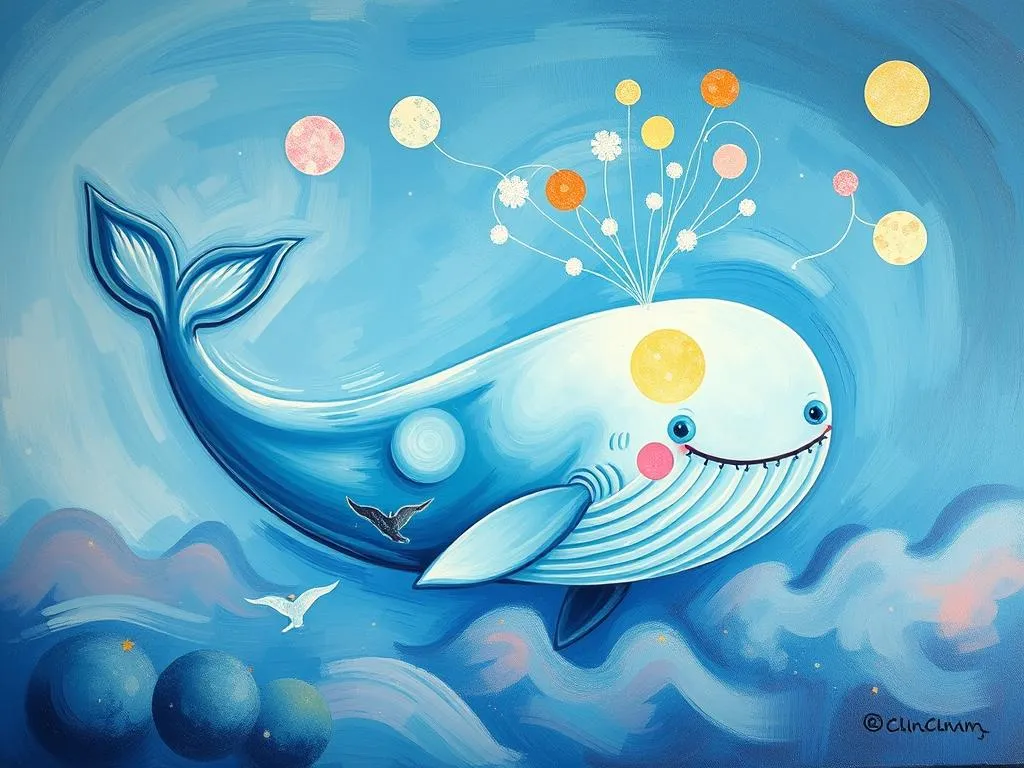
Introduction
Dreams have long captivated the human imagination, serving as a gateway to our subconscious, weaving together emotions, experiences, and symbols into narratives that can often leave us questioning their meanings. Among the myriad of creatures that populate our dreams, whales stand out as powerful symbols. Their immense size, gracefulness, and deep connection to the oceans make them compelling figures in both mythology and dream interpretation. People often feel a strong emotional response when dreaming about whales, which can lead to a deeper inquiry into what these dreams might signify. This article delves into the symbolism of whale dreams, exploring their meanings, variations, and how they can connect to our waking lives.
Symbolism and Meaning
Whales, as dream symbols, evoke a range of meanings and interpretations that can vary widely based on the dreamer’s personal experiences and feelings. Water, as the medium in which whales exist, often represents the subconscious, emotions, and the depths of our psyche. Thus, dreaming of a whale can signify a deep exploration of one’s inner self.
In many cultures, whales are seen as guardians of the mysteries of the ocean, symbolizing wisdom, intuition, and emotional depth. They can represent the dreamer’s desire to connect with their inner wisdom or to navigate through turbulent emotional waters. For instance, if a dreamer sees a whale breaching the surface of the water, it may symbolize a moment of revelation or clarity, suggesting that something previously hidden is now coming to light.
Conversely, dreaming of a stranded or struggling whale may reflect feelings of vulnerability or being overwhelmed by life’s challenges. It could indicate that the dreamer is grappling with their emotions, perhaps feeling isolated or unable to communicate effectively. In this sense, the whale becomes a mirror to the dreamer’s emotional state, urging them to confront their feelings or seek help in navigating their struggles.
Moreover, whales are often associated with community and social bonds, as many species exhibit complex social structures. This communal aspect can suggest that the dreamer is contemplating their relationships or feeling a need for connection. If the dreamer finds themselves swimming alongside a pod of whales, it might indicate a longing for belonging or support from others.
Key Scenarios and Variations
The interpretation of whale dreams can shift dramatically based on the specific scenarios presented. A few common variations include:
-
Swimming with Whales: When a dreamer envisions themselves swimming alongside these magnificent creatures, it can symbolize a sense of harmony with one’s emotions and a deep connection to one’s intuition. This scenario often signifies a time of personal growth and emotional healing, suggesting that the dreamer is in tune with their feelings and is ready to embrace their true self.
-
Whales in Distress: Conversely, witnessing a whale in distress, such as beaching itself or appearing sick, can evoke feelings of alarm. This scenario may reflect the dreamer’s anxieties about their own mental or emotional health or could symbolize a situation in their life that feels overwhelming. It serves as a wake-up call, prompting the dreamer to address issues before they escalate.
-
Diving Deep: Dreams that involve diving deep into the ocean to encounter whales can signify a journey into the depths of the subconscious. This act of diving often represents the dreamer’s willingness to explore hidden aspects of themselves, suggesting that there are insights and truths waiting to be uncovered.
-
Whales as Guides: In some dreams, whales may serve as guides, leading the dreamer through the waters. This can indicate a need for guidance in waking life, suggesting that the dreamer should trust their instincts or seek mentorship from someone who embodies wisdom and emotional depth.
-
Whale Songs: Hearing the songs of whales in a dream can signify a call to pay attention to one’s inner voice or intuition. These haunting melodies may represent the dreamer’s need to listen to their feelings and express themselves more authentically.
Each of these scenarios provides a unique lens through which the dreamer can explore their emotional landscape, offering opportunities for self-reflection and personal insight.
Real-Life Connections and Takeaways
Understanding whale dreams can lead to profound realizations about one’s life and emotional state. To connect these dreams to real-life situations, it’s essential for the dreamer to engage in personal reflection. Here are some strategies to help unpack the meanings behind these dreams.
First, consider the emotional state you were in during the dream. Were you calm, excited, fearful, or confused? This emotional backdrop can offer clues about what the dream might be addressing. For instance, if the dream was peaceful, it might suggest contentment with your current life situation or relationships. On the other hand, if you felt anxious, it could indicate unresolved issues that need your attention.
Next, reflect on any recent events or changes in your life that might correlate with the dream. Are there areas where you feel overwhelmed or unsupported? The imagery of whales can often highlight the need for community, prompting you to evaluate your social connections and whether you need to reach out for support.
Additionally, consider the actions of the whale in your dream. Were you interacting with it in a positive way or observing it from a distance? This can reveal your level of engagement with your own emotions. If you felt empowered while swimming with the whale, it may suggest that you are embracing your emotional journey. However, if you felt helpless as you watched a whale struggle, it may be a signal to address feelings of powerlessness in your waking life.
Lastly, journaling can be a powerful tool for self-reflection. Write down your dream in detail, noting any emotions, colors, and sensations you experienced. Over time, patterns may emerge that can lead to deeper insights about yourself. Ask yourself questions like, “What does this whale represent in my life?” or “How do I feel about the water in my dream?”
In closing, whale dreams hold rich symbolic meanings that can provide insights into our emotional well-being and personal growth. By exploring these dreams and their variations, dreamers can uncover deeper layers of meaning that connect to their waking lives. As you reflect on your own whale dreams, consider the emotions they evoke and the messages they may carry. This exploration not only fosters self-awareness but also encourages a more profound understanding of the interconnectedness of our experiences and emotions.







